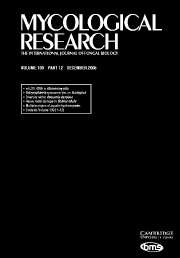Crossref Citations
This article has been cited by the following publications. This list is generated based on data provided by
Crossref.
Grogan, Helen M
and
Jukes, Andrew A
2003.
Persistence of the fungicides thiabendazole, carbendazim and prochloraz‐Mn in mushroom casing soil.
Pest Management Science,
Vol. 59,
Issue. 11,
p.
1225.
Tanovic, Brankica
Vracarevic, Maja
and
Potocnik, Ivana
2003.
Susceptibility of white button mushroom (agaricus bisporus lange) and its pathogens verticillium fungicola (preuss) hassebrauk and mycogone perniciosa (magnus) delacr. to fungicides.
Pesticidi,
Vol. 18,
Issue. 4,
p.
237.
Shleev, Sergey
Tkac, Jan
Christenson, Andreas
Ruzgas, Tautgirdas
Yaropolov, Alexander I.
Whittaker, James W.
and
Gorton, Lo
2005.
Direct electron transfer between copper-containing proteins and electrodes.
Biosensors and Bioelectronics,
Vol. 20,
Issue. 12,
p.
2517.
Grogan, Helen M
2006.
Fungicide control of mushroom cobweb disease caused by Cladobotryum strains with different benzimidazole resistance profiles.
Pest Management Science,
Vol. 62,
Issue. 2,
p.
153.
Adie, Bruce
Grogan, Helen
Archer, Simon
and
Mills, Peter
2006.
Temporal and Spatial Dispersal of
Cladobotryum
Conidia in the Controlled Environment of a Mushroom Growing Room
.
Applied and Environmental Microbiology,
Vol. 72,
Issue. 11,
p.
7212.
Amey, R. C.
Athey-Pollard, A.
Mills, P. R.
Foster, G. D.
and
Bailey, A.
2007.
Investigations into the taxonomy of the mushroom pathogen Verticillium fungicola and its relatives based on sequence analysis of nitrate reductase and ITS regions.
Microbiology,
Vol. 76,
Issue. 6,
p.
757.
Potocnik, Ivana
Rekanovic, Emil
Milijasevic, Svetlana
Todorovic, Biljana
and
Stepanovic, Milos
2008.
Morphological and pathogenic characteristics of the fungus Cladobotryum dendroides, the causal agent of cobweb disease of the cultivated mushroom Agaricus bisporus in Serbia.
Pesticidi i fitomedicina,
Vol. 23,
Issue. 3,
p.
175.
Mills, Peter
Thomas, John
Sergeant, Martin
Costa, Ana
Collopy, Patrick
Bailey, Andy
Foster, Gary
and
Challen, Mike
2008.
Stress in Yeast and Filamentous Fungi.
Vol. 27,
Issue. ,
p.
1.
Potočnik, Ivana
Vukojević, Jelena
Stajić, Mirjana
Rekanović, Emil
Milijašević, Svetlana
Todorović, Biljana
and
Stepanović, Miloš
2009.
In vitrotoxicity of selected fungicides from the groups of benzimidazoles and demethylation inhibitors toCladobotryum dendroidesandAgaricus bisporus.
Journal of Environmental Science and Health, Part B,
Vol. 44,
Issue. 4,
p.
365.
Potočnik, Ivana
Vukojević, Jelena
Stajić, Mirjana
Rekanović, Emil
Milijašević, Svetlana
Stepanović, Miloš
and
Todorović, Biljana
2009.
Toxicity of fungicides with different modes of action toCladobotryum dendroidesandAgaricus bisporus.
Journal of Environmental Science and Health, Part B,
Vol. 44,
Issue. 8,
p.
823.
Potocnik, Ivana
Rekanovic, Emil
Milijasevic, Svetlana
Todorovic, Biljana
and
Stepanovic, Milos
2009.
In vitro toxicity of fungicides of different mode of action to Agarics Bosporus (Lange) imbach.
Pesticidi i fitomedicina,
Vol. 24,
Issue. 1,
p.
29.
Tanovic, Brankica
Potocnik, Ivana
Delibasic, G.
Ristic, M.
Kostic, M.
and
Markovic, Mirjana
2009.
In vitro effect of essential oils from aromatic and medicinal plants on mushroom pathogens: Verticillium fungicola var. fungicola, Mycogone perniciosa, and Cladobotryum sp..
Archives of Biological Sciences,
Vol. 61,
Issue. 2,
p.
231.
Potocnik, Ivana
2009.
Identification and control of Cladobotryum spp., causal agents of cobeweb disease of cultivated mushroom.
Pesticidi i fitomedicina,
Vol. 24,
Issue. 3,
p.
165.
Back, Chang-Gi
Kim, Young-Hwan
Jo, Woo-Sik
Chung, Heewon
and
Jung, Hee-Young
2010.
Cobweb disease on Agaricus bisporus caused by Cladobotryum mycophilum in Korea.
Journal of General Plant Pathology,
Vol. 76,
Issue. 3,
p.
232.
Potočnik, Ivana
Vukojević, Jelena
Stajić, Mirjana
Rekanović, Emil
Stepanović, Miloš
Milijašević, Svetlana
and
Todorović, Biljana
2010.
Toxicity of biofungicide Timorex 66 EC to Cladobotryum dendroides and Agaricus bisporus.
Crop Protection,
Vol. 29,
Issue. 3,
p.
290.
Kim, M. K.
Lee, Y. H.
Cho, K. M.
and
Lee, J. Y.
2012.
First Report of Cobweb Disease Caused by Cladobotryum mycophilum on the Edible Mushroom Pleurotus eryngii in Korea.
Plant Disease,
Vol. 96,
Issue. 9,
p.
1374.
Llorent-Martínez, E.J.
Fernández-de Córdova, M.L.
Ruiz-Medina, A.
and
Ortega-Barrales, P.
2012.
Fluorimetric determination of thiabendazole residues in mushrooms using sequential injection analysis.
Talanta,
Vol. 96,
Issue. ,
p.
190.
Bailey, Andy M.
Collopy, Patrick D.
Thomas, D. John
Sergeant, Martin R.
Costa, Ana M.S.B.
Barker, Gary L.A.
Mills, Peter R.
Challen, Michael P.
and
Foster, Gary D.
2013.
Transcriptomic analysis of the interactions between Agaricus bisporus and Lecanicillium fungicola.
Fungal Genetics and Biology,
Vol. 55,
Issue. ,
p.
67.
Tamm, Heidi
and
Põldmaa, Kadri
2013.
Diversity, host associations, and phylogeography of temperate aurofusarin-producing Hypomyces/Cladobotryum including causal agents of cobweb disease of cultivated mushrooms.
Fungal Biology,
Vol. 117,
Issue. 5,
p.
348.
Kosanović, D.
Potočnik, I.
Duduk, B.
Vukojević, J.
Stajić, M.
Rekanović, E.
and
Milijašević‐Marčić, S.
2013.
Trichodermaspecies onAgaricus bisporusfarms in Serbia and their biocontrol.
Annals of Applied Biology,
Vol. 163,
Issue. 2,
p.
218.




